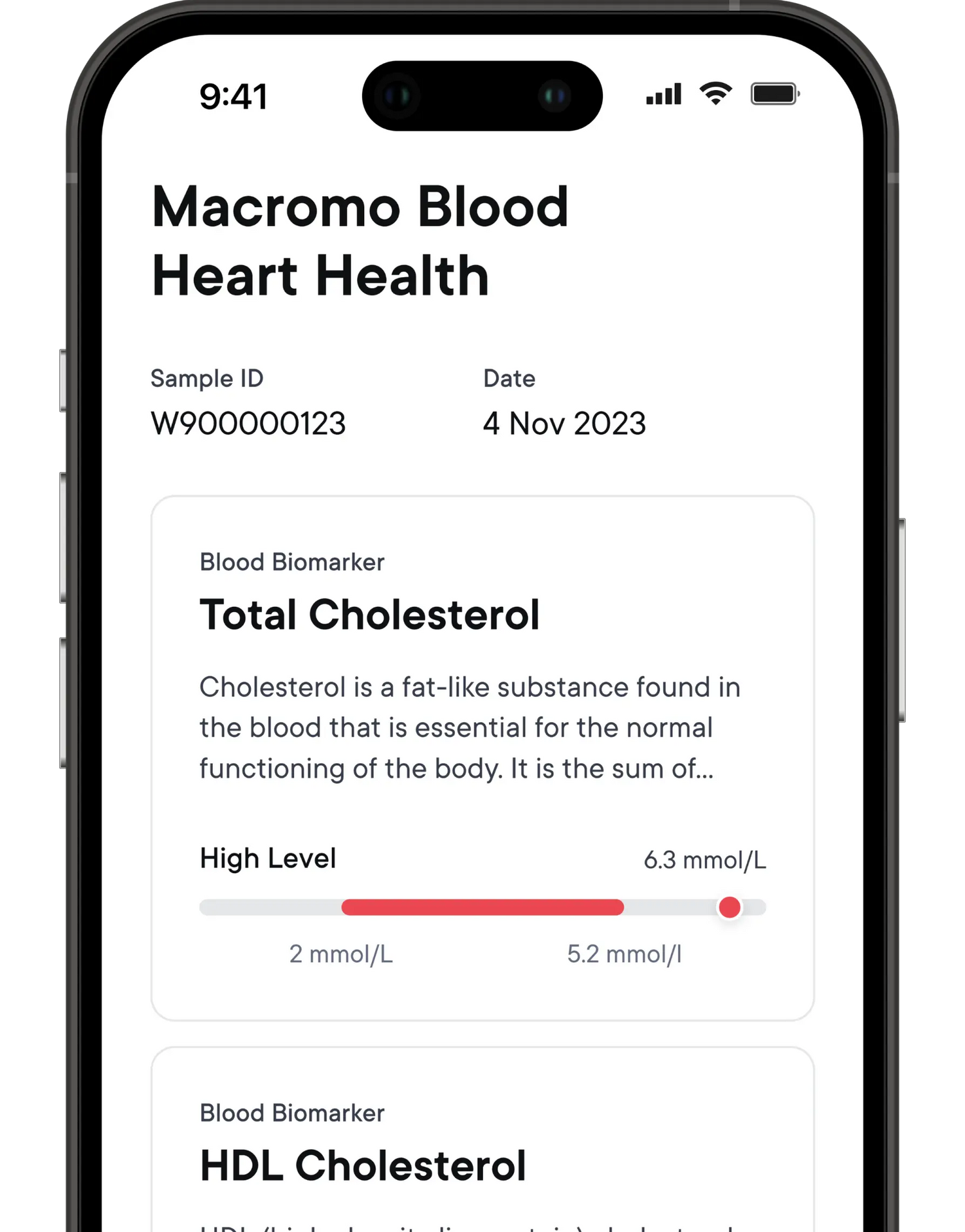




Meaningful insights into your health
Early detection of any irregularities
Timely interventions through lifestyle adjustments will help you live a healthy life and avoid future health problems.
Easy-to-understand results. Actionable recommendations
You get all your results in a Macromo mobile app which connects all your health data on one place and provides personalized recommendations for your healthier lifestyle.
Long-term monitoring of key biomarkers
To understand how your lifestyle affects your health, Macromo allows you to monitor overtime trends of your key health markers.
6 biomarkers that significantly affect cardiovascular health
By measuring these critical biomarkers, you can monitor the values of the most important indicators of your heart health. Early detection of any irregularities enables timely interventions and lifestyle adjustments, ensuring better management of conditions and promoting a healthier, more fulfilling life.
Total cholesterol
Cholesterol is a fat-like substance found in the blood that is essential for the normal functioning of the body. It is the sum of HDL-cholesterol ("high density"), LDL cholesterol ("low density") and other smaller particles in the blood. All non-HDL cholesterol particles can build up in the arteries and increase the risk of heart disease.
Cholesterol
Elevated Level
HDL
Optimal Level
HDL
HDL (high-density lipoprotein) cholesterol is often known as the "good" cholesterol. It helps transport cholesterol away from the blood, returning it to the liver, which keeps arteries clear and blood flowing smoothly. Higher levels of HDL cholesterol are typically associated with better heart health outcomes.
LDL
LDL (low-density lipoprotein) cholesterol, often called "bad" cholesterol, can build up in your arteries, reducing blood flow and potentially leading to heart attacks or strokes. Managing your LDL cholesterol levels is essential for safeguarding your heart and overall health.
ApoB
ApoB (Apolipoprotein B) is a protein integral to lipoproteins, including LDL cholesterol particles, reflecting the number of atherogenic particles. Unlike LDL-c, ApoB provides a more accurate measure of cardiovascular risk by considering variations in particle size and number, offering a superior assessment of atherogenic lipoprotein burden for predicting cardiovascular events.
HbA1c (diabetes risk)
HbA1c (glycated hemoglobin) reflects the average blood sugar level over the last two to three months. Monitoring blood HbA1c levels helps to control long-term blood glucose status and, if necessary, make the necessary lifestyle adjustments to prevent the onset or progression of diabetes.
Lp(a)
Lipoprotein(a), or Lp(a), is a specific type of lipoprotein in the blood that contains a cholesterol-rich particles. Elevated levels of Lp(a) are considered a risk factor for cardiovascular diseases, as it may contribute to the development of atherosclerosis and blood clot formation. Monitoring Lp(a) levels is relevant for assessing cardiovascular risk, and while lifestyle changes can impact other lipid levels, the genetic component makes Lp(a) less responsive to dietary modifications. If the test shows your Lp(a) level is elevated, you should talk to your healthcare provider and discuss possible treatment options.
Ing. Michal Pohludka Ph.D., MBA, LL.M.
Biochemist with a PhD in molecular pathology, co-founder of Macromo.

Results Guaranteed by Experts
Prevention guaranteed by experts
The Macromo blood test has been carefully compiled by a team of experienced doctors and healthcare professionals who have carefully selected and included specific biomarkers that provide valuable information about your health.
Certified clinical laboratory
We partner with top diagnostic laboratories to provide quality laboratory analysis used by physicians from primary care providers to teaching hospitals.
Frequently asked questions
Who is the test suitable for?
This test is for anyone who wants to take control of their heart health and monitor their risk of cardiovascular disease. Regular testing provides a detailed overview of cardiovascular health and is an important part of comprehensive prevention.
It is important to note that specific recommendations for testing may vary depending on medical history, risk factors, and health care provider assessment.
When will I get my results?
Results will be displayed on the Macromo mobile app within five business days of when we receive your sample.
What if I fail to draw blood?
If you fail to collect enough blood, the sample cannot be tested and you will need to repeat the collection. In this case, please contact us and we will send you a new collection kit free of charge.
Is the blood draw painful?
It is not. The blood draw is performed via a tiny puncture of an automated lancet into the belly of the finger, from which the blood is then collected into a tube. The puncture site may be slightly sensitive after the collection.
How quickly do I need to get the sample to the lab?
Once you have taken a blood sample at home, it is important to send it to the laboratory as soon as possible. Ideally, this should be done within 24 hours of collection. Biological material can begin to degrade over time, which can affect the accuracy of the test. Therefore, it is important to follow the instructions for the use of the kit carefully and deliver the sample to the laboratory promptly using prepaid shipping from PPL.
To avoid shipping complications, we recommend NOT sending samples on Friday afternoon or before a public holiday. Please note that if the sample degrades due to late shipment, it is considered the customer’s responsibility.
Why might my blood test results vary between different labs?
It’s important to understand that while all laboratories aim to deliver the most accurate results, variations between labs can occur. This is due to several factors, such as differences in the methods used to analyze samples, the precision of the equipment, the calibration of machines, and even how the samples are handled and stored. This does not necessarily mean that one lab’s results are wrong and another’s are right. Instead, it means that there might be slight differences between results due to these variable factors. To ensure consistency in our at-home testing service, we use a single lab to process all samples. This allows us to maintain control over many of these variables and provide you with the most consistent and reliable results possible.
Are there any medical conditions or medications that might make it unsafe to use this at-home blood test kit?
There are several medical conditions and medications that could potentially pose risks when using our at-home blood test kit. If you have a condition that affects blood clotting, such as a blood clotting disorder or if you're taking anticoagulant medication (blood thinners), we advise against using the kit. Similarly, individuals with blood-related disorders like hemophilia, other bleeding disorders, or a history of fainting with needle sticks or blood draws should also exercise caution. Additionally, those with poor peripheral circulation, such as individuals with diabetes or Raynaud's disease, may encounter difficulties in obtaining an adequate sample. If you are unsure about your condition it's best to consult with your healthcare provider to determine if an at-home blood test is suitable for you based on your specific medical circumstances. Our at-home blood test kit is designed for convenience and to supplement your regular health checks, but it's crucial that it's used safely.
What should I do if I use the at-home blood test kit and experience prolonged bleeding or bruising?
If you experience prolonged bleeding or significant bruising after using the at-home blood test kit, please seek immediate medical attention. It's important to note that these symptoms could be signs of an underlying condition that affects your blood's ability to clot, and you should discuss this with your healthcare provider. If you are experiencing an emergency, please dial the local emergency number right away.









